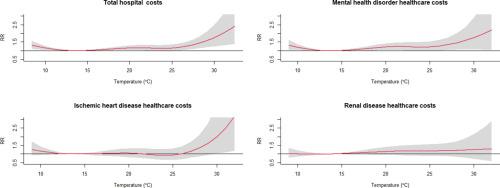Urban Climate ( IF 6.4 ) Pub Date : 2021-11-12 , DOI: 10.1016/j.uclim.2021.101028 Michael Tong 1 , Berhanu Yazew Wondmagegn 1 , Jianjun Xiang 1 , Susan Williams 1 , Alana Hansen 1 , Keith Dear 1 , Dino Pisaniello 1 , Blesson Mathew Varghese 1 , Jianguo Xiao 2 , Le Jian 2 , Ben Scalley 2 , Monika Nitschke 3 , John Nairn 4 , Hilary Bambrick 5 , Jonathan Karnon 6 , Peng Bi 1

|
The association between heat and diseases has been extensively reported. However, its associated healthcare costs and attributable fraction due to heat were scarcely explored. The aim of this study was to estimate hospitalisation costs attributable to heat in Sydney, and to project future costs under climate change scenarios. Using a distributed lag nonlinear model, this study estimated heat-attributable hospitalisation costs in Sydney; and using 2010–2016 data as baseline, future costs for 2030s and 2050s were estimated under three climate change scenarios depending on greenhouse gas emissions - Representative Concentration Pathway (RCP)2.6, RCP4.5, and RCP8.5. Higher temperatures were found to be associated with increased hospitalisation costs. About 8–9% of the total hospitalisation costs were attributable to heat. The total costs attributable to heat over the baseline period 2010–2016 were estimated to be AU$252 million, with mental health hospitalisation making the largest contribution. Hospitalisation costs are estimated to increase substantially to AU$387–399 million in the 2030s, and AU$506–570 million by mid-century under different climate change scenarios. Urgent action is required to reduce heat-attributable illness in our communities, particularly for mental health conditions. Relevant preparations including healthcare workforce capacity building and resource allocation are needed to deal with these challenges in the context of climate change.
中文翻译:

悉尼的热归因住院费用:气候变化背景下的当前估计和未来预测
热与疾病之间的关联已被广泛报道。然而,几乎没有探讨其相关的医疗保健成本和归因于热量的部分。本研究的目的是估算悉尼因高温导致的住院费用,并预测气候变化情景下的未来费用。本研究使用分布式滞后非线性模型估算了悉尼的热归因住院费用;并使用 2010-2016 年的数据作为基线,根据温室气体排放在三种气候变化情景下估算 2030 年代和 2050 年代的未来成本 - 代表性浓度路径 (RCP)2.6、RCP4.5 和 RCP8.5。发现更高的温度与住院费用的增加有关。大约 8-9% 的住院总费用归因于高温。2010 年至 2016 年基线期间因高温导致的总成本估计为 2.52 亿澳元,其中精神健康住院费用贡献最大。在不同的气候变化情景下,估计到 2030 年代住院费用将大幅增加至 3.87-3.99 亿澳元,到本世纪中叶将增加至 5.06-5.7 亿澳元。需要采取紧急行动来减少我们社区中由热引起的疾病,尤其是心理健康状况。应对气候变化背景下的这些挑战,需要做好相关准备工作,包括医疗保健人员能力建设和资源分配。在不同的气候变化情景下,估计到 2030 年代住院费用将大幅增加至 3.87-3.99 亿澳元,到本世纪中叶将增加至 5.06-5.7 亿澳元。需要采取紧急行动来减少我们社区中由热引起的疾病,尤其是心理健康状况。应对气候变化背景下的这些挑战,需要做好相关准备工作,包括医疗保健人员能力建设和资源分配。在不同的气候变化情景下,估计到 2030 年代住院费用将大幅增加至 3.87-3.99 亿澳元,到本世纪中叶将增加至 5.06-5.7 亿澳元。需要采取紧急行动来减少我们社区中由热引起的疾病,尤其是心理健康状况。应对气候变化背景下的这些挑战,需要做好相关准备工作,包括医疗保健人员能力建设和资源分配。


























 京公网安备 11010802027423号
京公网安备 11010802027423号